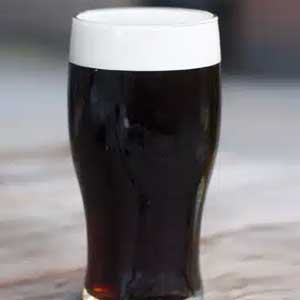
Irish Pub Songs for Voice
Irish Pub Songs for Voice
A collection of drink-related songs, intoning the joys and perils of beer, whiskey, and Poitin (Irish moonshine) - for voice with piano and chords accompaniment. Fans of The Pogues or The Dubliners will recognise many of these classic tunes, from the comical tale of drunken infidelity 'Seven Drunk Nights', with it's well-known chorus of 'Ah, you're drunk, you're drunk, you silly old fool' - to the haunting farewell tune 'The Parting Glass'.
1. The Parting Glass

Lyrics:
Of all the money that e'er I had
I spent it in good company
And all the harm I've ever done
Alas it was to none but me
And all I've done for want of wit
To memory now I can't recall
So fill to me the parting glass
Good night and joy be to you all
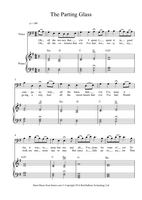
The Parting Glass
2. Wild Rover

Lyrics:
I've been a wild rover for many a year
And I spent all my money on whiskey and beer,
And now I'm returning with gold in great store
And I never will play the wild rover no more.
Chorus:
And it's no, nay, never,
No nay never no more,
Will I play the wild rover
No never no more.
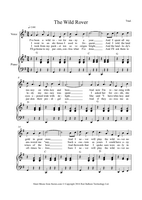
Wild Rover
3. Drunken Sailor

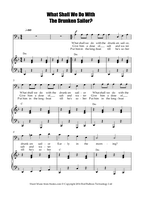
Drunken Sailor
4. Seven Drunk Nights

Lyrics:
As I went home on Monday night as drunk as drunk could be
I saw a horse outside the door where my old horse should be
Well, I called me wife and I said to her: Will you kindly tell to me
Who owns that horse outside the door where my old horse should be?
Ah, you're drunk, you're drunk you silly old fool,
So drunk you can not see
That's a lovely sow that me mother sent to me
Well, it's many a day I've travelled a hundred miles or more
But a saddle on a sow sure I never saw before
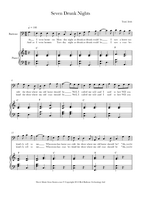
Seven Drunk Nights
5. Whiskey in the Jar

Lyrics:
As I was a goin' over the far famed Kerry mountains
I met with captain Farrell and his money he was counting
I first produced my pistol and I then produced my rapier
Saying "Stand and deliver" for he were a bold deceiver
Mush-a ring dum-a do dum-a da
Whack for my daddy-o.
Whack for my daddy-o
There's whiskey in the jar
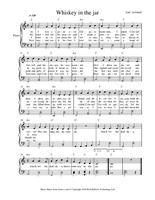
Whiskey in the Jar
6. I'm a man you don't meet every day (Jock Stewar...

Lyrics:
Now, my name is Jock Stewart
I'm a canny gaun man,
And a roving young fellow, I've been.
So be easy and free
When you're drinkin wi' me.
I'm a man you don't meet every day.
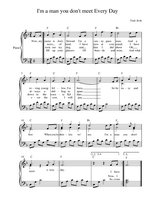
I'm a man you don't meet every day (Jock Stewar...
7. The Irish Rover

Lyrics:
On the fourth of July, 1806, we set sail from the cold cove of Cork
We were sailing away with a cargo of bricks for the grand City Hall in New York
'twas a wonderful craft, she was rigged fore and aft and oh, how the wild wind drove her
She stood several blasts, she had twenty-seven masts and they called her the Irish Rover
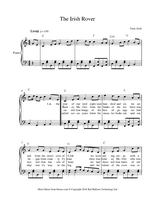
The Irish Rover
8. Rare Old Mountain Dew

It was written by Edward Harrigan with music by David Braham
Lyrics:
Let grasses grow and waters flow
In a free and easy way
But give me enough of the rare old stuff
That's made near Galway Bay
And policemen all from Donegal,
Sligo and Leitrim too
We'll give them the slip and we'll take a sip
Of the real old mountain dew.
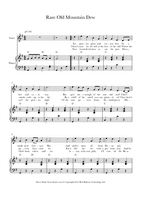
Rare Old Mountain Dew
